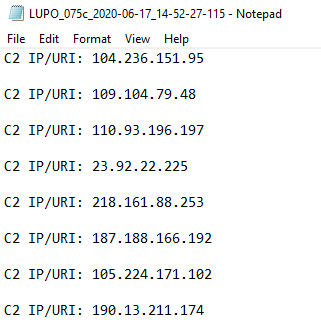
Lupo — Malware IOC Extractor
Debugging module for Malware Analysis Automation
Introduction
Working on security incidents that involve malware, we come across situations on a regular basis where we feel the need to automate parts of the analysis process as complete manual analysis is, more often than not, not possible for every case due to many factors (time, skills, scale, etc.).
I wrote Lupo mainly to automate and accelerate the process as much as possible. Lupo is a dynamic analysis tool that can be used as a module with the debugger. The first version works with the popular Windows Debugger — WinDbg. I’ll release versions for other debuggers in the future.
The way the tool works is pretty straightforward. You load Lupo into the debugger and then execute it. It runs through the malware and collects predefined IOC and writes them to a text file on the disk. You can then use this information to contain and neutralise malware campaigns or simply respond to the security incident that you are working on.
Lupo — the tool

I’ll give some more details on the tool itself but not too much on the inner workings of it, at least not here. We need to keep in mind that the malware authors are smart enough to quickly tweak the code to create problems for us!
The tool is written in C++ and uses the Windows Debugging framework to execute the code. It can be used with WinDbg as a ‘plugin’ in order to help automate the analysis process.
Usage

Using the tool is very easy. It works in this way:
- Save the Lupo extension in your extensions dir (default: sdk\samples\exts subdirectory of the installation directory). You can also define the extensions path by using the command ‘.extpath[+] [Directory[;…]]’.
- Start the debugger
- Attach the process to be debugged (malware in this case)
- Load Lupo using the ‘.load’ command.
- Execute Lupo by using this command: ‘lupo.go’
- All results will be displayed in the console and also written to a new textfile on the disk. Path and name of this textfile will be displayed in console as well. All done!
- You can optionally use the results from Lupo with this other tool that I wrote — Ragno, to advance your research and response by aggregating OSINT for the wider footprint of the campaign you are possibly dealing with. You can read about Ragno in another post here.
Download
Copyright (c) 2022 Vishal Thakur